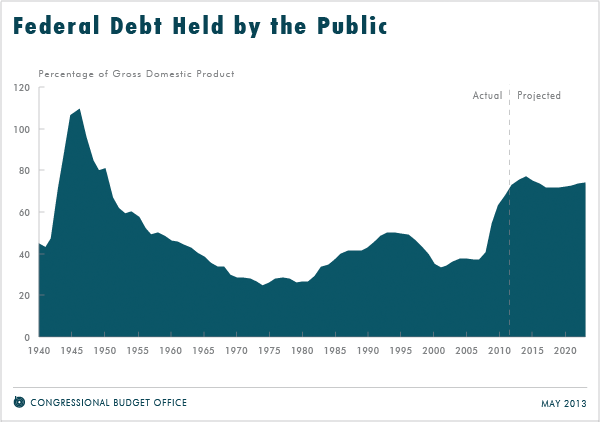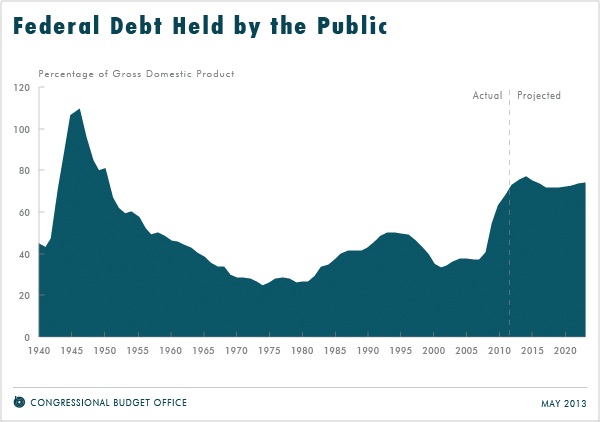(The Congressional Budget Office released its latest debt and deficit projections for the next ten years. There’s no way any honest analyst could read them as anything but the official end to any rational concern about red ink, says Doug Henwood. Image source: CBO)
Given that the phantasmic plays such a large role in politics, it’s likely that important people will still worry about fiscal ruin. But to the degree that reality exerts even a weak gravitational pull on discourse, it should be harder to generate the sense of crisis that austerians thrive on.
From the CBO’s summary:
If the current laws that govern federal taxes and spending do not change, the budget deficit will shrink this year to $642 billion, CBO estimates, the smallest shortfall since 2008. Relative to the size of the economy, the deficit this year—at 4.0 percent of gross domestic product (GDP)—will be less than half as large as the shortfall in 2009, which was 10.1 percent of GDP.
Because revenues, under current law, are projected to rise more rapidly than spending in the next two years, deficits in CBO’s baseline projections continue to shrink, falling to 2.1 percent of GDP by 2015.

The graph above shows the sharp rise in the debt/GDP ratio that came with the Great Recession is nearly over, and the line is about to go flat—flat at a level well below the now-discredited 90% danger level that Carmen Reinhart and Kenneth Rogoff got people all worried about until their work was exposed as bogus.
According to the spreadsheet that accompanies this release, the CBO projects the 2023 federal debt/GDP ratio to be 73.60%, down from 75.07% today. Over the next 10 years, they project revenues to rise by 1.6 percentage points of GDP, and spending to rise by 1.0 points, for a (rounded) shrinkage in the deficit of 0.5 points. (Before rounding, the decline is 0.547774045234583 points, a hilarious level of precision.) The CBO projects this year’s deficit at 4.0% of GDP, which is very close to the 3.0% that many orthodox analysts regard as trivial.
| This doesn’t mean fiscal hawks won’t piss and moan. They will. |
The spending projections for the next decade are quite austere. Social Security’s share of GDP is slated to rise by 0.4 percentage points, and health spending (Medicare, Medicaid, etc.) by 1.0 point, but other major spending categories will decline. Mandatory spending other than Social Security and health will fall by 0.4 points; military spending, by 1.2 points; and civilian discretionary spending (like education and environment), by 0.9%.
Whether that level of austerity is politically sustainable is an open question—people purport to hate government spending in the abstract, but when it gets down to specifics, the politics get a lot rougher. But these projections are what will happen if we continue on our current path.
This being American politics, it’s time to bring the rational, evidence-based portion of this post to a close. Austerians are driven by a mix of irrational anxiety and a desire to take benefits away from all but the rich. Benefits create expectations, and dilute the power of labor market discipline, both of which are potentially explosive. People don’t like to have things taken away from them, so it helps to create a sense of crisis to lubricate the process.
So what will the fiscal sadists do?
The CBO itself offers a hint of how to maintain deficit hysteria—the deficit will rise from 2020 to 2023, and could get really bad in the late 2020s (though they don’t provide any numbers).
Egads!
But the rise in the debt/GDP ratio from 2020 to 2023 is all of 2.2 percentage points, to a level still below today’s—and projections 15 or 20 years into the future are a thin support for drastic action today. (One should always read the numbers before the prose in reports like these.)
That doesn’t mean fiscal hawks won’t piss and moan. They will.
But their emoting will either have to get even more phantasmic—or more nakedly class war-ish.
Doug Henwood is the legendary editor of The Left Business Observer. Follow him @DougHenwood and @WashSpec.
This article originally appeared in the Left Business Observer.





0 Comments